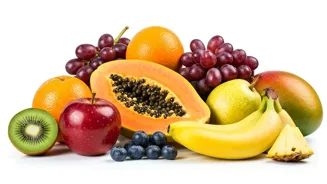Fruits For Digestion
Maintaining optimal digestive health is crucial for overall well-being, and dietary choices play a significant role in this. Numerous fruits possess properties
that facilitate smoother digestion and promote regular bowel movements. A doctor has recommended ten such fruits, highlighting their beneficial effects. These fruits offer a natural way to enhance gut health. Incorporating these options into a balanced diet can lead to improvements in digestive comfort and overall health. The following sections will explore these fruits in detail, detailing their unique attributes and how they help the digestive system function more efficiently. It’s important to note that individual responses to these fruits may vary, and it's always advisable to consult with a healthcare professional for personalized dietary advice.
Apples: Fiber Powerhouse
Apples are a great source of both soluble and insoluble fiber, which is important for digestive health. Soluble fiber, such as pectin, helps to slow down the digestion process, thus helping to regulate blood sugar levels and making you feel fuller for longer. It can also help bind cholesterol in the digestive tract, aiding its removal from the body. Insoluble fiber adds bulk to the stool, making it easier to pass through the intestines and preventing constipation. Apples also contain various antioxidants, which can help reduce inflammation in the digestive tract. Eating apples regularly is a simple and delicious way to support a healthy digestive system. Try eating an apple as a snack, adding them to salads, or enjoying them as part of a dessert.
Papayas: Enzyme Richness
Papayas are renowned for containing papain, an enzyme that aids in protein digestion. Papain helps break down proteins, making them easier for the body to absorb and utilize. This can be particularly beneficial for individuals who struggle with protein digestion, or those with conditions like irritable bowel syndrome (IBS). The fruit is also rich in fiber, which promotes bowel regularity. Consuming papaya can help alleviate bloating and constipation, leading to a healthier gut. Regular intake can improve overall digestive function. Papayas are easy to incorporate into the diet; they can be eaten fresh, blended into smoothies, or added to salads. Their mild, sweet flavor makes them an excellent addition to various meals.
Kiwi: Gut Motility Booster
Kiwi fruits are beneficial for improving gut motility. They are rich in fiber, which adds bulk to the stool, aiding in the prevention of constipation. Furthermore, kiwis contain an enzyme called actinidin, which helps to break down proteins, making digestion easier. The fruit has been shown to improve gut transit time and reduce bloating. For those seeking a natural way to improve digestive function, kiwi is a great choice. Including this fruit in the diet can help regulate bowel movements and promote overall digestive health. Kiwis can be eaten fresh or added to yogurt, cereals, or smoothies.
Prunes: Natural Laxative
Prunes have a long-standing reputation as a natural remedy for constipation. This is because they are extremely high in fiber. They also contain sorbitol, a natural sugar alcohol that has a mild laxative effect. Sorbitol draws water into the intestines, softening the stool and making it easier to pass. Eating prunes is a simple way to relieve constipation and promote regular bowel movements. It’s important to consume prunes in moderation. Excessive consumption can lead to side effects such as gas, bloating, and diarrhea. Prunes can be eaten as a snack or added to oatmeal and other dishes. Their sweet taste makes them a satisfying treat.
Mango: Enzyme Support
Mangoes are a delicious fruit that can contribute to digestive health through their enzyme content. They contain amylase enzymes, which help break down complex carbohydrates into simpler sugars, making them easier to digest. This can alleviate bloating and discomfort after eating carbohydrate-rich meals. Mangoes are also a good source of fiber, which further supports digestive regularity. The combination of enzymes and fiber makes mangoes beneficial for those with digestive issues. Whether eaten fresh, in a smoothie, or added to yogurt, mangoes provide both flavor and health benefits. Their versatility and tropical taste make them a great addition to many meals.
Oranges: High in Fiber
Oranges are a common fruit known for being high in fiber, which plays a critical role in digestive health. The fiber in oranges adds bulk to the stool, which can help prevent constipation and promote regularity. Oranges also contain a good amount of water, which is crucial for hydration and efficient digestion. The citric acid in oranges can stimulate digestive juices, further improving the breakdown of food. Eating oranges is a refreshing and tasty way to support the digestive system. Include oranges as a snack, or add the fruit to a salad to reap its advantages. They are readily accessible and packed with nutrients, making them an excellent choice for improving overall health.
Tamarind: Digestive Aid
Tamarind, often used in various cuisines, also offers advantages for digestive health. It contains tartaric acid, which functions as a natural laxative, helping to relieve constipation and promote bowel regularity. Tamarind is also known to stimulate the production of bile, which aids in the digestion of fats. This combination makes tamarind a useful natural remedy for improving digestion. Tamarind can be incorporated into the diet through beverages, sauces, or candies. It has a unique, tangy flavor that complements various dishes. Regular consumption can help improve digestion, making it a good choice for those looking for natural ways to support gut health.
Cherries: Fiber Boost
Cherries, while primarily recognized for their antioxidant properties, also support digestive health. They are a source of fiber, crucial for maintaining regular bowel movements. Fiber adds bulk to the stool, which helps prevent constipation. Eating cherries can contribute to a more efficient digestive process and help reduce digestive discomfort. Including cherries in the diet is easy. Cherries can be eaten as a snack or added to various dishes like salads and desserts. Although the fiber content in cherries is less compared to some other fruits, they still offer benefits. Cherries are a tasty and refreshing addition to a balanced diet.
Dragonfruit: Prebiotic Benefits
Dragonfruit is a unique fruit, and is becoming more well known for its digestive benefits. It contains prebiotics, which are types of fiber that feed the beneficial bacteria in the gut. This can help improve the balance of gut flora, which plays a key role in overall digestive health. A healthy gut microbiome can lead to improved digestion, enhanced nutrient absorption, and a stronger immune system. Regular consumption of dragonfruit can contribute to a healthier gut environment, thus improving gut health. Dragonfruit is easily incorporated into the diet. It can be eaten fresh, blended into smoothies, or added to various dishes. Its unique flavor and health benefits make it a valuable addition to a healthy diet.













